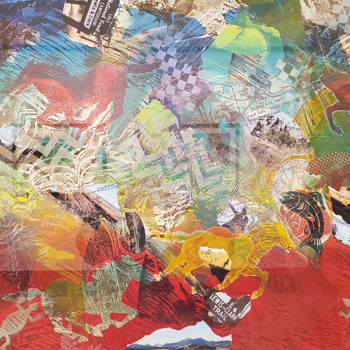Reading through a Brutal Winter
 Artwork by DALL·E
Artwork by DALL·E
At the center of Amos Oz’s 1973 novel, Touch the Water, Touch the Wind, is a church fronted by “a small, rough-paved square, sagging toward the middle.” On the edge of this square, a pair of ancient horses stand motionless, “like statues from an equestrian group whose riders have been hacked off in the course of some political upheaval.” But these horses are alive we are told. The setting is a little Polish town, identified in the archaic literary shorthand M-----, the only place designated in this manner in the entire novel, the other historic locales allowed to keep their real names—Damascus, Warsaw, Palestine, Israel.Like a lot of postmodern fiction from this era, the book can sometimes feel like an elaborate hustle. But here I am in the twenty-first century, reading it in-doors despite the fact that the brutal winter I’m in the middle of is temporarily breaking and outside the air is mild, sky a deep cerulean shading to yellow and I know that in two days it will snow again. Why am I so enraptured by this novel, why has this slim book spoken to me in a way that few others have been able to lately?
The ancient Greek word moira references the three mythical fates, the Moirai, and means a portion of the whole. I take this to mean that the fates—Clotho (birth), Lachesis (the duration of life), and Atropos (death)—though three distinct personalities, are still a part of the whole, that the whole would become a fragmentation without even one of them. I feel that Oz’s novel, too, would become a fragmentation if there wasn’t this little church in M----- even though we never step inside its edifice, even though no one seemingly does. It’s hard not to feel unsettled then, when, into all this static rusticity, a young girl appears in the distance, running and struggling in the wind, crying, clutching something—“the gray light makes it impossible to tell what.”
Perhaps I should put the book down for a bit, make a cosmo, open a can of nuts. Sometimes, when I’ve been indoors all day, especially on a pretty day like today, my chest tightens and I feel that I’m not doing what I should be doing. I keep bringing more and more books into our house, reading and writing the days away, looking for clues in pages well-thumbed, screen glowing back into my face. As the sun sets and Brooklyn twenty- and thirty-somethings skate and stroll past my window, I can’t help but think I’m a square, think about that empty square in Oz’s novel, that girl running, falling, getting up again and running, two horses still enough to be statues.





